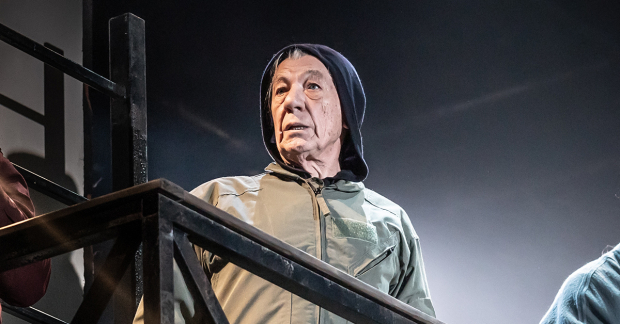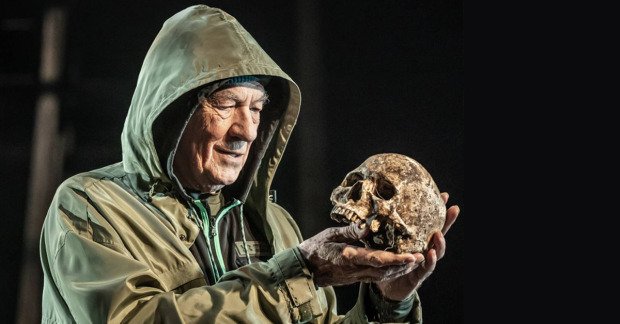Hamlet with Ian McKellen at Theatre Royal Windsor – review
McKellen plays the titular role in this age-blind production.

© Marc Brenner
Headlines have accompanied every step of the long, pandemic-delayed run-up to the opening of this production of Hamlet. The main one was that at the age of 82, Ian McKellen was about to become the oldest Prince of Denmark the UK has ever seen. He was doing so in a production that was age, colour and gender blind, with Francesca Annis, once McKellen's Juliet, now cast as the ghost of Hamlet's father and an Ophelia in the shape 20-something Alis Wyn Davies. So far, so intriguing.
Then bad news began to break. Steven Berkoff, who was due to play Polonius, left the production as had Emmanuella Cole, cast as Laertes, his son. She had complained about his behaviour to the actors' union Equity. McKellen was "under strain" and even "in tears" – claims hotly denied.
If only the production had been as sensational as the anticipation. When Hamlet, directed by Sean Mathias finally opened in sweltering heat, in a non-socially-distanced Edwardian playhouse, what the audience were presented with was a chance to watch one of the greatest actors of our age have another shot at a character whom he first played fifty years ago. And some decent performances around him. It was all right, but it didn't set the world alight.
McKellen remains the principal reason to see the show. His familiarity with the language of Shakespeare gives him the sense of living inside it, making it seem entirely natural as spoken English, lending each utterance a conversational feel that reaps many rich rewards. It is particularly effective in the soliloquies that have become over-familiar: his "To be or not to be" is delivered in discussion with Ben Allen's humane and attentive Horatio, reading from a book, making its statements casual and questioning: "What a piece of work is man" ends with every syllable of "quintessence" rolled around his mouth as if savouring the thought.

© Marc Brenner
But he also finds unexpected moments all through the text. When the Player King breaks down in tears, he answers his own question as he marvels at his tears – "All for nothing" – switching quickly to the thought "Well, for Hecuba." The discovery of Yorick's skull is played without fear and with the relaxed confidence that comes with the years. His verse-speaking yields constant surprises: things you expect to be loud are quiet, other moments are explosive.
It's impossible not to notice his age, however heavily disguised it is by hoodies, T-shirts and drainpipe jeans. But it doesn't really matter when he's alone, or with Jonathan Hyde's excellent, oily Claudius. He pulls off the fighting and the running up and down the stairs on Lee Newby's cumbersome set quite effectively. Where it feels more problematic is in the scenes with Ophelia, where the contrast between them is just uncomfortable.
That set is a problem too. With its overhead gantry, and the audience sitting around on stage, it isolates actors from each other so they end up communicating over distance and Wayne McGregor's choreography doesn't seem to have extended beyond the scenes with the players; too often you are faced with the idea that all actors need to do is stand still and speak their lines. This tendency is compounded by the fact Mathias doesn't seem to have a view of the play; he throws in gimmicks such as an exercise bike for Hamlet and some loud pop music, but each individual seems very much left to make their own mark.
Some do this very well. Frances Barber as Polonius and Ashley D Gayle as Laertes, both late recruits to their roles, pull them off with considerable liveliness. Wyn Davies, although lumbered with both a guitar and a terrible series of costumes, and forced to sing most of her lines, gives off a terrible, wounded ferocity as Ophelia. Annis impresses with her brief appearance. Llinos Daniel is actually funny as the gravedigger.
But as the evening progressed, I found myself remembering Rita's immortal line in Willy Russell's Educating Rita when asked how she would solve the staging problems of Peer Gynt. "Do it on the radio." There was nothing I was watching that wouldn't have been equally or better served by simply listening to it. For all its apparent modishness, the production is stodgily old-fashioned.
What you are left with is the pleasure of hearing McKellen, one of our greatest actors, speaking the lines, thinking them aloud for a second time, returning to a part he felt he had failed in. Perhaps that's enough to justify all those headlines.













